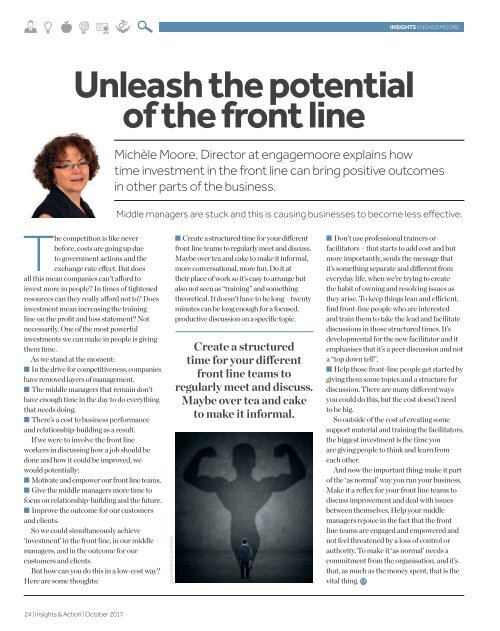EP Insights & Action
Expert observers comment on the Industry. This magazine is designed to bring together the thought leadership, ideas and opinions of leading consultants and operators from across the industry. EP's vision is to create an open narrative and debate that explains the perspective and thinking on the market and Industry. It will help all progress, so let us know your thoughts, subscribe and be involved.
Expert observers comment on the Industry. This magazine is designed to bring together the thought leadership, ideas and opinions of leading consultants and operators from across the industry. EP's vision is to create an open narrative and debate that explains the perspective and thinking on the market and Industry. It will help all progress, so let us know your thoughts, subscribe and be involved.
You also want an ePaper? Increase the reach of your titles
YUMPU automatically turns print PDFs into web optimized ePapers that Google loves.
INSIGHTS ENGAGEMOORE<br />
Unleash the potential<br />
of the front line<br />
Michèle Moore, Director at engagemoore explains how<br />
time investment in the front line can bring positive outcomes<br />
in other parts of the business.<br />
Middle managers are stuck and this is causing businesses to become less effective.<br />
The competition is like never<br />
before, costs are going up due<br />
to government actions and the<br />
exchange rate effect. But does<br />
all this mean companies can’t afford to<br />
invest more in people? In times of tightened<br />
resources can they really afford not to? Does<br />
investment mean increasing the training<br />
line on the profit and loss statement? Not<br />
necessarily. One of the most powerful<br />
investments we can make in people is giving<br />
them time.<br />
As we stand at the moment:<br />
n In the drive for competitiveness, companies<br />
have removed layers of management.<br />
n The middle managers that remain don’t<br />
have enough time in the day to do everything<br />
that needs doing.<br />
n There’s a cost to business performance<br />
and relationship-building as a result.<br />
If we were to involve the front line<br />
workers in discussing how a job should be<br />
done and how it could be improved, we<br />
would potentially:<br />
n Motivate and empower our front line teams.<br />
n Give the middle managers more time to<br />
focus on relationship-building and the future.<br />
n Improve the outcome for our customers<br />
and clients.<br />
So we could simultaneously achieve<br />
‘investment’ in the front line, in our middle<br />
managers, and in the outcome for our<br />
customers and clients.<br />
But how can you do this in a low-cost way?<br />
Here are some thoughts:<br />
© XIMAGINATION | 123RF.COM<br />
n Create a structured time for your different<br />
front line teams to regularly meet and discuss.<br />
Maybe over tea and cake to make it informal,<br />
more conversational, more fun. Do it at<br />
their place of work so it’s easy to arrange but<br />
also not seen as “training” and something<br />
theoretical. It doesn’t have to be long – twenty<br />
minutes can be long enough for a focused,<br />
productive discussion on a specific topic.<br />
Create a structured<br />
time for your different<br />
front line teams to<br />
regularly meet and discuss.<br />
Maybe over tea and cake<br />
to make it informal.<br />
n Don’t use professional trainers or<br />
facilitators – that starts to add cost and but<br />
more importantly, sends the message that<br />
it’s something separate and different from<br />
everyday life, when we’re trying to create<br />
the habit of owning and resolving issues as<br />
they arise. To keep things lean and efficient,<br />
find front-line people who are interested<br />
and train them to take the lead and facilitate<br />
discussions in those structured times. It’s<br />
developmental for the new facilitator and it<br />
emphasises that it’s a peer discussion and not<br />
a “top down tell”.<br />
n Help those front-line people get started by<br />
giving them some topics and a structure for<br />
discussion. There are many different ways<br />
you could do this, but the cost doesn’t need<br />
to be big.<br />
So outside of the cost of creating some<br />
support material and training the facilitators,<br />
the biggest investment is the time you<br />
are giving people to think and learn from<br />
each other.<br />
And now the important thing: make it part<br />
of the ‘as normal’ way you run your business.<br />
Make it a reflex for your front line teams to<br />
discuss improvement and deal with issues<br />
between themselves. Help your middle<br />
managers rejoice in the fact that the front<br />
line teams are engaged and empowered and<br />
not feel threatened by a loss of control or<br />
authority. To make it ‘as normal’ needs a<br />
commitment from the organisation, and it’s<br />
that, as much as the money spent, that is the<br />
vital thing.<br />
24 | <strong>Insights</strong> & <strong>Action</strong> | October 2017
















